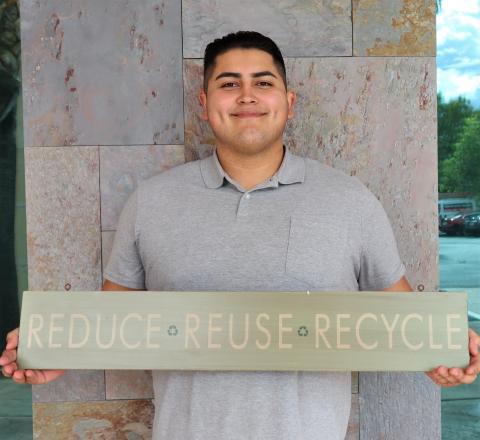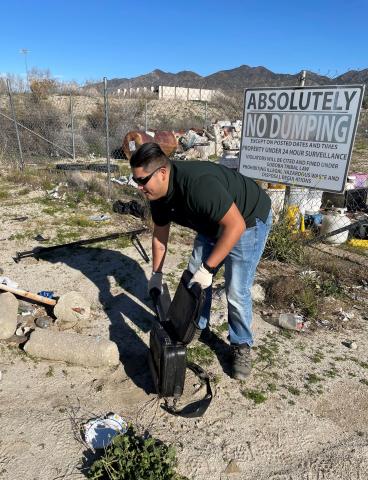The Soboba Tribal Environmental Department hosts quarterly community cleanups at the Soboba Indian Reservation to help homeowners dispose of unwanted items. It also serves as a way for household hazardous waste to be disposed of properly.
Environmental Director Christian Aceves said the event scheduled for Feb. 23 was extended due to the unexpected winter storm that brought rain, hail and freezing temperatures to the area. Residents were encouraged to stop by the collection area on Soboba Road through the weekend.
“Residents seem grateful for the event; it gives them a chance to clean up around their homes and it gives us the opportunity to remediate this waste and get it off the reservation,” he said. “We also offered a 40-yard bin dedicated to other solid waste just to help everyone out.”
The most common HHW people have on hand are batteries, fertilizer, paint, oil, aerosol cans, pesticides and cleaning chemicals. The reasons these items should not be left lying around people’s houses and properties is because they can catch fire, react or explode under certain conditions and they are corrosive or toxic. Even empty containers can pose a hazard because of the residual chemicals that might remain.
Aceves, of Moreno Valley, started working at Soboba in October 2021 with a strong desire to oversee an environmental department and programs. He holds two bachelor’s degrees from California State University, San Bernardino with one in Environmental Studies and the other in Geography. He has more than a year of experience working with Federally Recognized Native Tribes, specifically managing and coordinating EPA programs such as the Clean Water Act and the Indian Environmental General Assistance Program.
“My ultimate goal for this department will be to build its capacity,” Aceves said. “Incorporating additional funding will allow for bigger environmental projects, increased community education and engagement, and it will keep Soboba’s natural resources pristine for multiple generations to enjoy. We don’t want them to inherit our issues.”
The department is 100% funded by grants and Aceves said the focus of one that was recently approved will allow for a permanent HHW transfer station to be located on the Reservation. This will not only ensure residents an opportunity to dispose of unused paint, oil and other household hazardous waste when it is most convenient for them, it will provide a location where regular pickups can be made.
“In its simplest form, a transfer station is a facility with a designated receiving area where waste collection vehicles discharge their loads,” Aceves explained. “The waste is often compacted, then loaded into larger vehicles (usually transfer trailers, but intermodal containers, railcars, and barges are also used) for long-haul shipment to a final disposal site—typically a landfill, waste to-energy plant, or a composting facility. No long-term storage of waste occurs at a transfer station; waste is quickly consolidated and loaded into a larger vehicle and moved off site, usually in a matter of hours or days.”
He said that until the permanent transfer station is built, his department will continue to host quarterly HHW community cleanup events.
“What we want to avoid is having chemicals and other items dumped in the canyon and other remote areas of the reservation where they can seep into the groundwater that provides the primary drinking water for the residents,” Aceves said. “Water resources need to be viable – they are necessary to life, not only are they culturally important and relevant but spiritually as well.”
The Environmental Department has numerous ongoing projects including water quality monitoring for Soboba’s surface water. Aceves said monitoring is conducted monthly to ensure surface water is remaining within state water quality parameters. This ensures the streams remain healthy to support cultural and recreational usage.
The department is planning for its annual Earth Day event on April 28 with a theme of “Face the Waste.” The event, open to Tribal members and Soboba employees, will include local vendors, food, games, raffles, community engagement and will promote education on local and global environmental issues.
“We are also working towards expanding an Air Quality Monitoring program,” Aceves said. “This program will monitor Soboba’s air quality to ensure each Tribal Member and neighboring communities are breathing clean and healthy air.”
For more information, www.epa.gov or https://epa.soboba-nsn.gov.
Photos courtesy of the Soboba Band of Luiseño Indians





